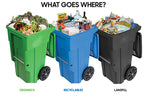
Recyclable or Not? Rethinking the Disposal of Commonly Misplaced Items
, by Planet Green, 4 min reading time

, by Planet Green, 4 min reading time
Recycling has become an integral part of our efforts to reduce waste and protect the environment. However, many commonly recycled items pose challenges due to the need for specialized recycling treatment or contamination issues. Items such as toothpaste tubes, takeaway packaging, juice cartons, and inkjet cartridges often end up in recycling bins, but their improper disposal hampers the recycling process. We need to look at the complexities surrounding these items and explore alternative disposal methods to ensure their proper handling.
One daily item we dispose of is toothpaste tubes. Typically made of a combination of plastics and aluminum, they are often mistakenly placed in recycling bins. The multi-layered structure of these tubes requires specialized recycling facilities to separate and process the materials effectively. Unfortunately, such facilities are not commonly available. Therefore, toothpaste tubes are best disposed of through alternative means, such as participating in manufacturer take-back programs or exploring waste-to-energy options, but they shouldn’t go into the blue plastic bin as they get sorted out and go directly into landfills.

Takeaway food packaging is another item we use daily in society but often have little concern for it’s disposal. Disposable cups, food containers, and utensils all pose a significant recycling challenge due to contamination issues. These items are frequently soiled with food residues, grease, or other substances, rendering them difficult to recycle effectively. To ensure proper disposal, it is crucial to separate and clean these items before recycling. However, recycling options may still be limited, and exploring alternatives such as composting or reducing their use altogether may provide a more environmentally friendly.
There is no shortage of juice cartons in the consumer market. Commonly found in virtually every household refrigerator, these are often mistakenly assumed to be recyclable due to their paper-like appearance. However, these cartons are usually composed of multiple layers, including plastic, aluminum, and paper. The separation and recycling of these layers require specialized facilities, which are not universally available. It is essential to check with local recycling programs to determine if juice cartons are accepted or explore alternative disposal methods such as waste-to-energy facilities. In most instances, like toothpaste tubes, they get sorted out of the recyclables and end up in landfills.

Inkjet cartridges are widely used in homes and offices, but their disposal presents unique challenges. While these cartridges are most often recyclable, they require a specialized recycling processes due to their complex construction and potential contamination by residual ink. When put into the blue bin, they get sorted out and end up in landfills at a rate of 1 million cartridges a day in the US alone! Many manufacturers and office supply stores provide collection programs for used inkjet cartridges, allowing consumers to return them for proper recycling. Another option is to send them in to an ink cartridge specific recycler, like Planet Green Recycle in Chatsworth, CA. It is essential to explore these programs and ensure that cartridges are disposed of correctly to maximize their recycling potential.
As consumers, we need to rethink our disposal methods to ensure the proper disposal of items that are either difficult to recycle or highly contaminated.
Here are a few approaches to consider:
Together, consumers can make a difference in the flow of trash going into landfills and help reduce the spread of waste and toxins entering the environment. Spread the awareness of recycling and make an effort to encourage proper recycling habits within your community. We can leave a cleaner environment for generations to come with simple changes today.

When people talk about e-waste, the conversation usually centers on big-ticket items: cell phones, laptops, televisions, or kitchen appliances. But one of the most common...

Most people see a printer cartridge as a small, everyday item. But behind that small piece of plastic is a surprisingly large environmental cost. Every...

The phrase “circular economy” has become a buzzword in sustainability circles, but what does it really mean? In simple terms, it’s about designing products and...

For years, recycling ink cartridges often meant relying on office collection bins, retail drop-off points, or corporate programs tied to large accounts. But as more...